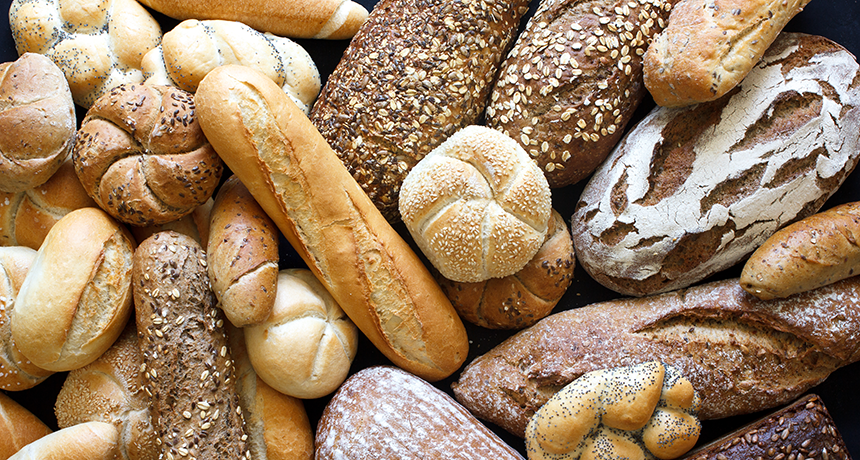Your gut’s germs may decide whether white bread or whole wheat is best — for you
Those bacteria can determine whether the body’s blood sugar levels will spike after eating certain starchy foods

Whether white bread or whole grains is a healthier choice can depend on who's eating it — and the microbes that they harbor in their gut, new data show.
etiennevoss/iStockphoto
Which is healthier: Grocery store white bread or an artisanal sourdough loaf? The answer will depend on the microbes living in someone’s gut. That’s the finding of a new study.
Carbohydrates, such as the sugars and starches in bread, raise the levels of glucose — or blood sugar — after a meal. How much blood sugar goes up after eating is important. Too much glucose in the blood (especially for a long time) can be dangerous, especially in people with diabetes or with metabolic syndrome. High blood sugar can cause damage to the blood vessels and more.
How much and how quickly a food raises blood sugar is known as its glycemic (Gly-SEE-mik) index, or GI. And some breads can have a very high GI. In this study, the researchers were trying to understand if a food’s GI is really a good measure of how a food will affect a particular person’s blood sugar.
To find out, the researchers asked 20 healthy people to eat white bread for one week. The bread was the regular kind people could buy at any grocery store. On a different week, each ate whole wheat sourdough bread. The sourdough bread came from a special bakery.
Many people think whole wheat bread is healthier than white because it has more fiber and vitamins. Those get removed when making white flour. White bread also contains preservatives — chemicals that keep it from spoiling. Some research suggests those chemicals might hurt friendly bacteria that live in the body. Harming those bacteria might lead to obesity. Some people think sourdough might be especially good for you because it helps the body get minerals from its ingredients.
During the bread-eating trial, people weren’t allowed to eat pasta, sweets or other high-carb foods. That was so that the researchers could be sure any changes were caused by the bread and not by other foods. During each phase of this trial, the researchers measured how the recruits’ bodies had responded to the bread. This included their blood sugar levels.
When responses for the whole group of people were averaged together, the researchers saw no difference between the types of bread. But when they examined each person individually, a difference did emerge. In some, blood sugar climbed more after eating white bread than after the whole wheat bread. That had been expected. After all, whole-grain products tend to have a lower glycemic index. But the surprise: In some recruits, the whole wheat bread caused their blood sugar to spike more.
Eran Elinav, Eran Segal and their colleagues at the Weizmann Institute of Science in Rehovot, Israel, conducted the study. They reported their new findings June 6 in Cell Metabolism.
A trend emerges …
The new data are part of a growing body of evidence that suggests advice about what’s healthiest to eat may depend on the individual.
Work that these same researchers had reported in November 2015 showed that how different people respond to eating a variety of foods can vary a lot. For instance, one person’s blood sugar shot up after eating a banana, but not after eating a cookie. Other people had more expected reactions: Cookies increased their blood sugar more than bananas did.
Last year, research with mice also suggested that differences in their genes may cause one type of mouse to gain weight on a diet that helps another type slim down. Some mice got fat and had health problems even on “healthy” diets, such as the so-called Mediterranean diet. This diet will be full of vegetables, fish and nuts — all considered good-for-you foods. Other mice barely gained weight even when they ate fatty, sugary food (the mouse version of burgers, fries and donuts).
In their new study, the Israeli researchers wanted to know what was causing people’s blood sugar to react differently to the bread. It could be that genes determine the response, like they do in mice. But earlier research had hinted that gut microbes might play a role. A combination of genes and microbes might even be responsible.
To find out, the researchers examined each recruit’s genes.They also analyzed what microbes had been living in each person’s gut. (To do this, they sorted through the microbes that got excreted in each person’s poop.) And here, how someone responded to the two types of bread could be predicted by which microbes had been in that poop. Amounts of two particular bacteria were especially predictive. The researchers don’t yet know what these bacteria do that affects blood sugar levels.







